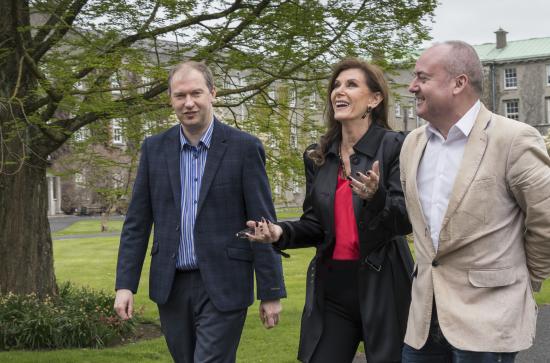
Irish Version
On 11 April, Maynooth University becomes the home of the Eurovision Song Contest for just one day. Addressed by Eurovision legend, Linda Martin, The Eurovision Song Contest in a Changing World: Culture, Geography and Politics conference brings together academics and fans of Eurovision alike to examine what makes it special and what, if anything, it says about the modern European landscape.
Speaking before the event Professor John O’Brennan of the Maynooth Centre for European and Eurasian Studies said: “There is no other event in popular culture that so unites and divides opinion as the Eurovision Song Contest. In Central and Eastern Europe participation in Eurovision is viewed as an affirmation of European identity - ‘we have arrived,’ ‘we are accepted,’ ‘we are European’ - while in other countries closer to home the event is viewed with a jaundiced eye. Whether viewed as a pop culture phenomenon or a vehicle for resurgent and atavistic nationalism, Eurovision continues to capture the imagination like no other event of its kind.”
Dr Adrian Kavanagh of the Department of Geography in Maynooth put the event in context saying: “Since the first contest took place in Lugano in Switzerland in 1956, the Eurovision Song Contest has grown in size, scale and popularity, with the live final being watched by an estimated 200 million viewers each year and by many million more viewers through online platforms.
“While the contest seeks to be non-political, political issues have arisen throughout the contest's history, with the extent of these perhaps increasing in intensity following the expansion of the contest in the late 1990s and 2000s. The Eurovision Song Contest voting patterns are probably the one aspect of the contest to be particularly portrayed as being political in scope, but they also reflect other factors, such as culture and common music markets.”
The Eurovision Song Contest in a Changing World: Culture, Geography and Politics is hosted by the Department of Geography and the Centre for European and Eurasian Studies.
Tagann an comórtas Eoraifíse chuig Ollscoil Mhá Nuad
Ar an 11 Aibreán, beidh Ollscoil Mhá Nuad ina ceanncheathrú do Chomórtas Amhránaíochta Eoraifíse ar feadh lae. Labhróidh an laoch Eoraifíse, Linda Martin, ag an gcomhdháil dar teideal The Eurovision Song Contest in a Changing World: Culture, Geography and Politics. Tugann an chomhdháil seo deis d’acadóirí agus do lucht leanúna an chomórtais Eoraifíse teacht le chéile le plé a dhéanamh ar na rudaí atá speisialta faoin gcomórtas seo agus ar an méid a léiríonn sé faoi chúrsaí na hEorpa sa lá atá inniu ann, má léiríonn sé dada.
Ag labhairt roimh an ócáid, dúirt an tOllamh John O’Brennan ó Ionad an Léinn Eorpaigh agus Eoráisigh in Ollscoil Mhá Nuad: “Níl aon ócáid eile ann i gcultúr na ndaoine a thugann tuairim an phobail le chéile nó a scoilteann tuairim an phobail mar a dhéanann an comórtas Eoraifíse. Creidtear san Eoraip Láir agus in Oirthear na hEorpa gur dearbhú atá sa chomórtas ar an bhféiniúlacht Eorpach - ‘táimid anseo,’ ‘glactar linn,’ ‘is Eorpaigh muid’ – i dtíortha níos gaire do bhaile áfach breathnaítear ar an ócáid go soiniciúil. Má bhreathnaítear ar an ócáid mar fheiniméan de chuid an lae inniu nó mar ardán do náisiúnachas athéiríoch agus athdhúchasach, téann an Eoraifís i bhfeidhm go cumhachtach ar shamhlaíocht phobal an lae inniu ar bhealach atá éagsúil ó ócáid ar bith eile den chineál sin.”
Chuir an Dr Adrian Kavanagh ón Roinn Tíreolaíochta in Ollscoil Mhá Nuad an ócáid i gcomhthéacs. Dúirt sé “Ó cuireadh an chéad comórtas ar bun in Lugano san Eilvéis sa bhliain 1956, tá fás tagtha ar an méid agus ar an éileamh atá ar an gComórtas Amhránaíochta Eoraifíse. Meastar go mbreathnaíonn 200 milliún duine ar an mbabhta ceannais gach uile bliain agus go mbíonn cúpla milliún duine sa bhreis ag breathnú air trí ardáin ar líne.
“Cé go ndéanann an comórtas iarracht a bheith neamhpholaitiúil, tá ceisteanna polaitiúla le feiceáil i stair an chomórtais. Is dócha gur mhéadaigh an ról a bhí ag na ceisteanna seo nuair a méadaíodh an comórtas ag deireadh na nóchaidí agus sna blianta ina dhiaidh sin. Léirítear go bhfuil baint ag an bpolaitíocht leis na pátrúin vótála go háirithe, ach léiríonn siad gnéithe eile, mar shampla, an cultúr agus cómhargaí ceoil. “
Reáchtálfaidh an Roinn Tíreolaíochta agus Ionad an Léinn Eorpaigh agus Eoráisigh The Eurovision Song Contest in a Changing World: Culture, Geography and Politics.
